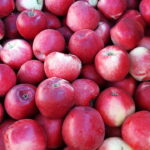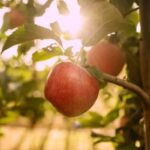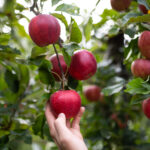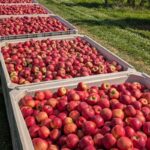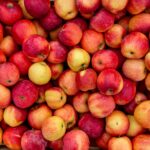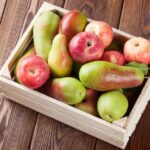U.S.: More 'Juici' apple volumes to start flowing as planting ramps up

The cross between Honeycrisp and Braeburn has flavor that's "unlike any other apple that’s out there", according to Oneonta Starr Ranch Growers (OSRG) marketing representative Bruce Turner. 
While the Braeburn apple variety might be falling out of favor with growers and consumers across the globe, through natural cross-breeding with other cultivars it has spawned leading brands such as Jazz, Envy and Kanzi.
And now a new brand is in the mix - Juici - with parentage from the immensely popular Honeycrisp cultivar.
At the Produce Marketing Association (PMA) Fresh Summit last week, Turner told Fresh Fruit Portal last year was the first commercial crop for the fruit with small volumes.
"This year it’s going to double. Outside of that, with our current commitment of planting in the U.S. this is about a million-carton crop but it’s going to take us a while to get there," Turner said of the apple, which was bred by Regal Fruit International.
The executive was unable to give a production estimate beyond the percentage rise, but did highlight the campaign would be fairly short and a full season wouldn't be seen until 2019.
"Juici is a cross between Honeycrisp, which currently is the most valuable apple at retail in the United States, and a Braeburn - that unique blend of parentage gives us a flavor that’s kind of unlike any other apple that’s out there," Turner said.
"The addition of the two parents together gives us a denser apple – it still has a fracture in your mouth when you bite it, like a Honeycrisp, and the juice runs down both sides of your mouth. The flavors are a bit more intense because it’s got a bit more acid in it."
He said that density went a long way in terms of storage possibilities.
"A Honeycrisp off the tree is 15lbs, a really hard one can be 16lbs, and commonly its 13lbs at the time of shipping," the executive said.
"These come off the tree at 20lbs. We've taken this fruit and left it out of CA (controlled atmosphere) for for 8-10 months and it only loses one or two pounds' pressure.
"The density is incredible – the shelf life this gives us for retail is this apple doesn’t shrivel, it doesn’t turn brown."
He said there were trees that were eight years' old in the company's test orchard, but the oldest commercial plantings were put in four years ago, meaning there's a lot of room for growth.
"We've got lots in the ground behind that. And we’ve got trees that are in quarantine in New Zealand and Chile for the Southern Hemisphere," he said.
"We can store this apple for 12 months and eat it out of CA, but like any apple it’s going to taste better in months two and three than in months 11 and 12.
"We want to have a little Southern Hemisphere acreage just to get us through the last three months and ideally we would like to have a 12-month program of superior eating quality; this apple really delivers."
He said select retail customers had been chosen in a wide varieties of U.S. locations, including the Northwest, Southwest, Midwest, Southeast and Northeast.
"Part of that was we wanted to see how this apple would perform in all those different palate regions – you look at the taste palate of Minnesota and Illinois, you’ve got that Midwest Braeburn lover," he said.
"You go to southern California and you’ve got more of a Hispanic palate, obviously a sweeter palate.
"The thing is, it performs equally well in each of these regions of the country. It’s just got enough sweetness and tartness that it seems to go really well."
He added the company was excited about the exponential growth ahead.
"With the retailers we’ve partnered with they’ve said while we don’t have enough to run a program, we’ll take enough to run the week-and-a-half program you have for us. People will want to build with us in the future."
While the plan for now is to focus on the North American market primarily, Oneonta does have exclusive marketing rights worldwide for Juici.
"We’ve had retailers from Hong Kong, Taiwan, come through our orchards, taste this and say "I’ll buy every one of them"," Turner said.
"When we tell them the relative price compared to the Gala they buy a lot of, it’s a bit of a hiccup, but interestingly enough, for the Asian palate we’ve had a lot of interest in the apple."
















